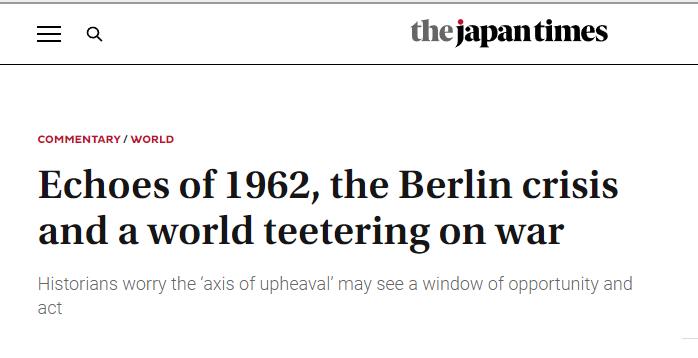
Echoes of 1962, the Berlin crisis and a world teetering on war
Historians worry the ‘axis of upheaval’ may see a window of opportunity and act
Every now and then, I come across analysis so incisive, intelligent and unsettling that I’m forced to stop and take a deep breath.
Historian Philip Zelikow’s recent ruminations on contemporary geopolitics is one such work. His warnings about the prospects for worldwide war in the next three years sadly tied together a slew of new writings — and recent events — that all underscore the dangers of the world we live in.
Start with the emergence of “the axis of upheaval,” a cabal that includes China, Russia, Iran and North Korea. The moniker was coined by Andrea Kendall-Taylor and Richard Fontaine, of CNAS, the Washington-based national security think tank. The group has been getting considerable attention in recent weeks since China, North Korea and Iran have been identified as “critical enablers of Moscow’s war machine.”
In fact, however, their ties go much further back. Those countries have long felt a powerful attraction. Both Moscow and Beijing have courted Pyongyang and Tehran, seeing those governments as partners in projects to challenge Western power and prerogatives. The war has accelerated the deepening of their ties across virtually every dimension of international interaction.
They are united by grievance. Kendall-Taylor and Fontaine argue that this group is bound by a “shared opposition to the Western-dominated global order, an antagonism rooted in their belief that that system does not accord them the status or freedom of action they deserve.” Those four countries seek to overturn existing rules, norms and institutions that check the spread of their influence and power and are willing to court instability to achieve this objective.
They cooperate to enhance their military capabilities and diplomatic clout, while simultaneously undermining international institutions that might check those efforts as well as the economic power that is the foundation of U.S. global power. They reject universal values, human rights and international democracy — if it checks the assertion of their national prerogatives. But they argue that all countries are equal insofar as they must have respect for their internal political system.
archive.is/unWTW#selection-1415.0-1437.488
Middle East about to explode: Expected attack on Israel will come from multiple fronts simultaneously, putting the defense coalition to the test.
Iran and Hezbollah continue to threaten an ‘unprecedented response,’ but Israel has yet to change Home Front Command directives; Assessments suggest the attack will come from multiple fronts simultaneously, putting the international coalition to the test; U.S. is also increasing its presence in the region, preparing for a large-scale interception operation
Amid ongoing threats from Hezbollah and Iran, Israel is on high alert, preparing for a broad attack by Tehran and its proxies in retaliation for the assassinations of Hamas political bureau chief Ismail Haniyeh and senior Hezbollah official Fuad Shukr. The assumption is that a significant response could come from multiple fronts in the coming days, potentially coordinated by Iran with all its proxies: Hezbollah, the Houthis, and militias in Syria and Iraq.
www.ynetnews.com/article/s1f4xotfc
Killing of Hamas chief in Iran stirs fears of retaliation
www.reuters.com/world/middle-east/hamas-chief-ismail-haniyeh-killed-iran-hamas-says-statement-2024-07-31/
h/t mark000
Views: 323